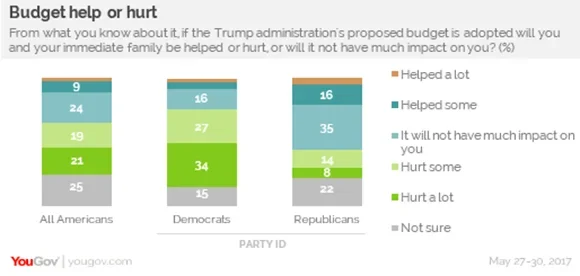32% of Americans think there is a very likely chance of a terrorist attack against the United States in the next 12 months
A foreign trip that divides the public. Continued dismay over the firing of former FBI chief James Comey and support for an independent counsel to investigate the Administration’s pre-Inaugural dealings with Russia. Growing concern about some members of the President’s inner circle. A budget that most Americans don’t see as helping them. And a terrorist attack abroad that raises worry in the country.
Foreign trips can help a President. But the response to Donald Trump’s first foreign venture did little to affect his ratings. Four in ten in the latest Economist/YouGov Poll approve of how he handled that trip – but more, 46%, did not. And for what may matter more – his overall approval rating – the trip changed little. In fact, the 38% approval rating the President receives in this poll is one point lower than the rating he held last week, which had marked his all-time low. As has been the case for the last few weeks, 51% disapprove of how he is doing his job.
There also is no improvement in how Americans think the President is handling foreign policy. This week, 37% approve, but 45% do not.
Just about eight in ten Republicans approve of the President’s overall performance, but as YouGov’s Senior Political Analyst Joe Williams noted last week, the share of Republicans “strongly approving” dropped 50% last week and remains there this week. 45% of Republicans strongly approve of the President’s performance.
The trip did create better feelings about Saudi Arabia – the first foreign country Mr. Trump visited as President. The percentage now viewing Saudi Arabia as an ally or friendly country jumped ten points in the last two weeks, from 33% to 43%. Two weeks ago, 39% saw that country as unfriendly or an enemy. Now that number is nine points lower.
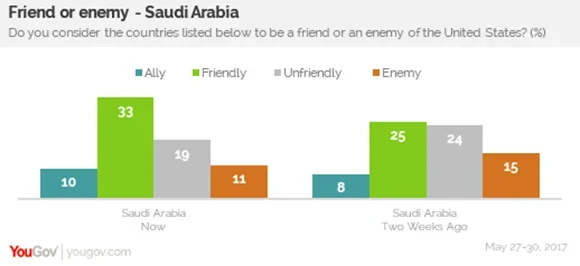
The President’s latest Twitter criticisms of Germany may not resonate with most of the public. More than two in three (and three in four Republicans) view Germany as a friendly country. And there is little support for a move to abandon the North Atlantic Treaty Organization (NATO), even among Republicans. Only one in five Republicans favor the U.S. withdrawing from NATO. And by two to one, the public – Republican and Democrat -- believes the United States has a responsibility to provide military assistance when asked to by its allies.
American concern about terrorism at home rises with every attack abroad. After the November 2015 terror attacks in Paris, more than three in four Americans said they thought an attack in the U.S. in 2016 was at least somewhat likely. A year later, that percentage dropped to six in ten. Now, after the Manchester concert attack, the percentage has grown again. This time, unlike some earlier instances, there is little difference in the levels of concern expressed by Democrats and Republicans (fewer independents express high concern, but many of them admit they can’t predict what will happen).
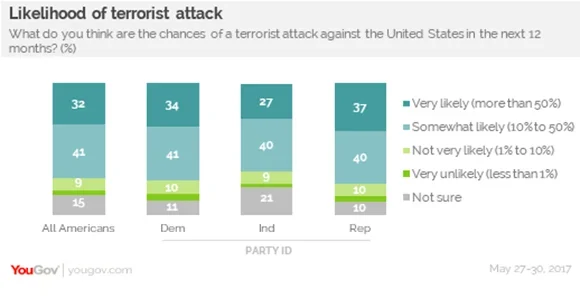
By 57% to 43%, Americans say confrontation, not staying out of other countries’ affairs, will make us safer. As for Trump Administration policies, Americans aren’t so sure. More than a third say that in four years the country will be less safe from terrorism than it is now – just 22% think it will be safer.
On the domestic front, both Republicans and Democrats continue to support the appointment of a special counsel to investigate Russian influence in the 2016 election, just as they did last week, even though a partisan difference remains when the public evaluates the firing of James Comey from his post as FBI Director. By 46% to 28%, Americans think the President has tried to influence the Russia investigation. But was anything improper or illegal done by anyone in the Administration? Maybe. Pluralities answer “yes” to each question, though the margins are not wide, and many remain undecided.
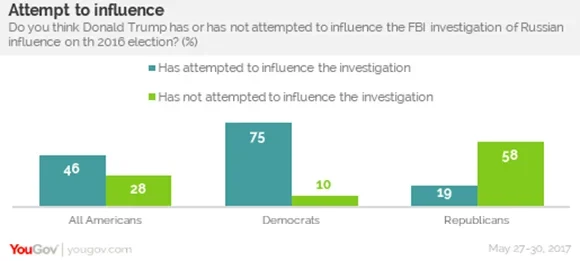
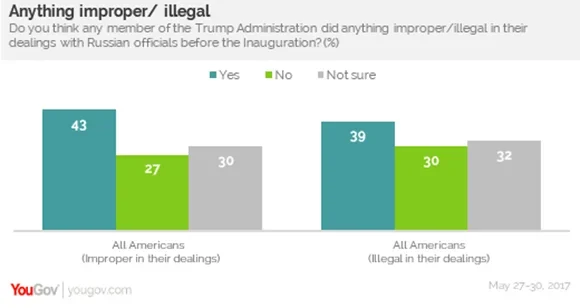
As for those who may have had contact with Russian officials, opinion is negative. By more than two to one, the public has an unfavorable view of Michael Flynn, the President’s former National Security Advisor (Republicans are divided). Opinions of Jared Kushner, the President’s senior adviser and son-in-law, are only slightly less negative, 25% favorable and 42% not favorable. That is in part because Republicans give Kushner positive ratings, 50% favorable to 17% unfavorable.
The President’s budget appears to be headed nowhere in Congress, according to both Democrats and Republicans. There is little love for it from the public, too. Even Republicans are as likely to say that the President’s budget would hurt them or their families as to say it would help them.
